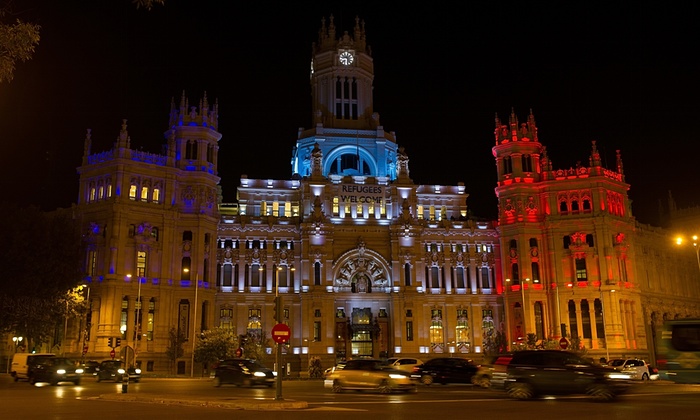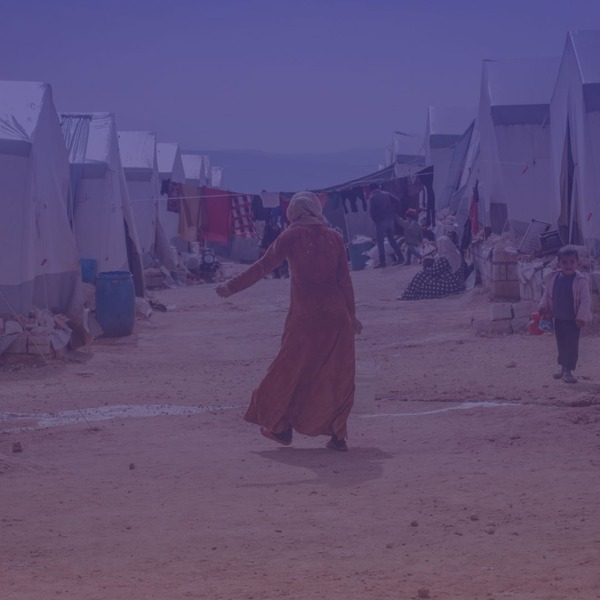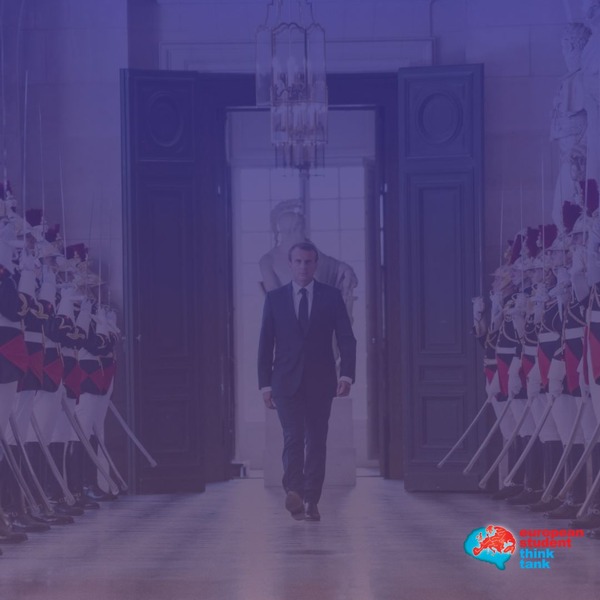
By Daniel Rubio Sánchez, student of International Business and International Relations at the Universidad Europea de Madrid and ambassador to Spain for the European Student Think Tank.
What happened in Paris on the 13th of November is the deadly and most miserable expression of the growing threat that jihadist terrorism is becoming to France. The French République has been hit by a series of coordinated terrorist attacks that could just be the beginning of a war to be waged for decades. It will not be – or should not be – a war against Islam or the Middle East, it should be a tireless battle for human rights, peace and harmony. Our society is being attacked and Paris has been targeted as the symbol of modern society that the terrorists want to knock down. Now is the time for us Europeans to put the political and cultural differences aside and join forces against a common threat to our values and security. Now is the time for Europe to stand up and act united.
France, a target for terrorists
France is the preferred target of al Qaeda in the Islamic Maghreb (AQIM) and its partner organizations in the region. Ever since the 2013 French military intervention in Mali there have been oaths of revenge against France that in August 2014 spread its military mission against terrorism to the entire Sahel with Operation Barkhane (Ministére de la Défense, 2015). As the official propaganda mouthpiece for ISIS (Karmon, 2015) Dabiq stated in July 2015 (Dabiq, 2015), “France is part of the nation crusader coalition against the Caliphate” and it is among the top five countries where “it is very important that attacks occur” (Dabiq, 2014). The origin of this special hatred against France can be found in the bombings France launched last year against ISIS positions in Iraq (Willsher, 2014).
France is targeted, but the rest of Europe, the United States and their allies are targeted too. The Islamic State has been able to adapt the way terrorism draws attention from people by using new ways of spreading fear through propaganda. These new ways of communicating their actions and horrible crimes make it more difficult for European governments to control information and terrorist recruitment. ISIS has several magazine-like media outlets similar to the aforementioned Dabiq that serve as a recruitment tool especially, for the younger generations. Internet, globalization and the availability of information across borders become a double-edged sword when it comes to terrorism. The easiness the Internet offers people to find information about terrorist groups via forums or magazines is worrisome. The intensity of jihadist radicalization processes in France has reached unprecedented levels, especially among young people, descendants of Muslim immigrants, affected by an explosive combination of existential dissatisfaction, relative deprivation induced hatred and identity crisis. France has become, with no less than 1,550 in Syria, the biggest Western producer of foreign jihadists to the Islamic State and the Nusra Front (Abdo, 2015) (Pearce, 2014). The French government lead by the Prime Minister Manuel Valls tried to stop this trend in the beginning of 2015 with a plan to prevent Jihadist recruitment (Ziv, 2015) but apparently, taking into account the terrible events that have taken place in France this year, these plans have failed.
Time for action
Some analysts believe the Paris terror attacks will prompt a more aggressive Western strategy on ISIS (Baker & Schmitt, 2015). It is not ruled out considering that the lack of US response has led Russia to take military leadership in Syria (Oliker, 2015) (Zakheim, 2015). Events are showing that the Western strategy is not working and this makes it easier for Hawks influencing foreign policy in Washington to have their thesis reinforced and continue asking, in a more aggressive way if possible, that military troops enter in Syria once and for all. The cohesion the EU foreign policy lacks since its inception will make it even easier for the US to press France or Germany to toughen their attacks against ISIS. The first response was seen with the first bombing of ISIS positions in Syria by the French air force. An escalade seems very probable. (Tzemach Lemmon, 2015)
Standing still was never a valid option for the US or European countries, but it is less of an option now when European people are starting to get scared and terrorists are achieving their sole goal: to terrorize people. The time of soft has ended and it is now impossible to avoid the use of the word ‘war’. Terrible as this may sound, Western countries do not seem to have taken the Syrian and Middle Eastern problem seriously until dead bodies have begun to reach their shores, trying to escape from a horror that is already here. It is somewhat paradoxical that while the European anti-immigration discourse is reinforced by those fleeing the horror they experience in their home countries. that same horror is already inside our countries too. It is now clearer than ever that the xenophobic discourse of Le Pen or Viktor Orban has rather little to do with reality. Refugees are running away from the same terrorists we have to fight against because they are here. It would have been desirable to prevent hundreds of thousands of people from having to leave their homes and their families. We could have done much more but we were absorbed by the debate on the deficit and Greece.
However, we can waste time by blaming ourselves for everything that we have done wrong or tracing a serious and collective plan among European countries and allies all around the world to face this global threat. It is time for action, but ISIS will not be defeated by action led only by the West. It will have to be democracies against terror, not the West against the Middle East. Repeating Iraq would be a catastrophic (Fawaz, 2014) mistake that Obama seems eager to avoid, but the fear to finish his term in office with wars and casualties cannot and should not restrain the US president from acting if needed, as is needed now. Nobody likes wars, but we all like to live quietly and it will not be possible unless we defeat those who want to terrorize us (Boot & Kirkpatrick, 2015). There will be no place for the Europe we want to live in until we make it possible for Europeans to live normally and peacefully as they would expect.
The President of the French Republic very w when es makes it more di Thisng Article 5 after the US worth noting that his words were very w when es makes it more di has defined the attacks in Paris as an “act of war”, allowing NATO’s collective response principle, enshrined in Article 5 of the North Atlantic Treaty, to be called upon if needed (North Atlantic Treaty Organization, 1949). It is doubtful that president Hollande will invoke NATO’s founding treaty to respond to the attacks in Paris, but it is worth noting that the president’s words were carefully chosen in this address to the nation to keep an ace up his sleeve if needed. “France will be merciless toward the ISIS barbarians”, he said, pointing out that his strategy will not be to step back against the terrorists.
If France wants to become the second state invoking Article 5 after the US, the first step would be to call for an Article 4 consultation. This would convene the ambassadors of the 28 NATO member states, who are always in permanent session in Brussels, to discuss the situation and decide on a plan for action. This already happened when Turkey requested an Article 4 meeting after the Islamic State attacks there in 2014.
It seems reasonable and likely that a meeting prompted by Article 4 would conclude that the Paris attacks should be considered an attack under Article 5. That would be entirely appropriate from my point of view. The terrorist attacks are anything but the culmination of a humanitarian disaster in Syria, that has destabilized the Middle East and initiated a flow of people willing to have a better future into Europe, which is in part our responsibility. NATO can no longer pretend the conflict does not affect its most basic interests. If it does, it will miss an opportunity to justify its own existence to an international community that is increasingly willing to leave military actions as the last possible option in situations like this and it will also miss an opportunity of building an “open coalition” against ISIS that should include the force of Russia. It is time for action.
This piece expresses the opinions of the author only and does not necessarily reflect the position of the European Student Think Tank.
Bibliography
Abdo, G. (2015, August 13). Brookings. Retrieved November 16, 2015, from This Sudanese school’s students are rapidly joining ISIS: http://www.brookings.edu/research/opinions/2015/08/13-sudan-students-join-isis-abdo
Baker, P., & Schmitt, E. (2015, November 14). New York Times. Retrieved November 15, 2015, from http://www.nytimes.com/2015/11/15/world/europe/paris-terror-attacks-response-islamic-state.html?_r=0
Boot, M., & Kirkpatrick, J. J. (2015, November 15). How to Fight a Real War on ISIS. Retrieved November 16, 2015, from Council of Foreign Relations: http://www.cfr.org/terrorist-organizations-and-networks/fight-real-war-isis/p37252
Dabiq. (2014, October). Retrieved November 15, 2015, from https://azelin.files.wordpress.com/2015/02/the-islamic-state-e2809cdc481biq-magazine-422.pdf
Dabiq. (2015, July). Retrieved November 15, 2015, from https://azelin.files.wordpress.com/2015/07/the-islamic-state-e2809cdc481biq-magazine-1022.pdf
Fawaz, Y. K. (2014, September 23). The Hill. Retrieved November 16, 2015, from In combating ISIS, Obama risks repeating Iraq mistakes : http://thehill.com/blogs/congress-blog/foreign-policy/218535-in-combating-isis-obama-risks-repeating-iraq-mistakes
Karmon, E. (2015, April 29). Islamic State and al-Qaeda Competing for Hearts & Minds. Retrieved November 16, 2015, from International Institute for Counter-Terrorism: http://www.ict.org.il/Article/1384/Islamic-State-and-al-Qaeda-Competing-for-Hearts-Minds
Ministére de la Défense. (2015, November 3). Ministére de la Défense. Retrieved November 15, 2015, from http://www.defense.gouv.fr/operations/sahel/dossier-de-presentation-de-l-operation-barkhane/operation-barkhane
North Atlantic Treaty Organization. (1949, April 4). North Atlantic Treaty Organization. Retrieved November 15, 2015, from http://www.nato.int/cps/en/natohq/topics_110496.htm
Oliker, O. (2015, October 29). Russia in Syria. Retrieved November 16, 2015, from Center of Strategic International Studies (CSIS): http://csis.org/publication/russia-syria
Pearce, E. (2014, September 3). Brookings. Retrieved November 16, 2015, from ISIS and the Politics of Radicalization: http://www.brookings.edu/blogs/markaz/posts/2014/09/03-pearce-isis-and-the-politics-of-radicalization
Tzemach Lemmon, G. (2015, November 16). What will change now? Retrieved November 16, 2015, from Council on Foreign Relations: http://thehill.com/blogs/congress-blog/foreign-policy/218535-in-combating-isis-obama-risks-repeating-iraq-mistakes
Willsher, K. (2014, September 19). France bombs ISIS depots in Iraq. Retrieved November 16, 2015, from The Guardian: http://www.theguardian.com/world/2014/sep/19/france-bombs-isis-depot-iraq-islamic-state
Zakheim, D. S. (2015, October 15). Yes, Putin has a strategy in Syria. Retrieved November 16, 2015, from National Interest: http://nationalinterest.org/feature/yes-putin-does-have-strategy-syria-14084
Ziv, S. (2015, January 29). Newsweek. Retrieved November 15, 2015, from http://www.newsweek.com/france-launches-online-offensive-prevent-jihadist-recruitment-303079

 The ’Ndrangheta’s Infiltration and Threat to European Institutions
The ’Ndrangheta’s Infiltration and Threat to European Institutions  From Paper to Practice: How Grassroots Norms Undermine Gender Rights in Pakistan
From Paper to Practice: How Grassroots Norms Undermine Gender Rights in Pakistan  Exploited Childhoods: The Role of Global Corporations in Perpetuating and Mitigating Child Labour
Exploited Childhoods: The Role of Global Corporations in Perpetuating and Mitigating Child Labour  Human Rights Challenges in Addressing SLAPPs in Media, NGOs and Journalism in the EU
Human Rights Challenges in Addressing SLAPPs in Media, NGOs and Journalism in the EU 


